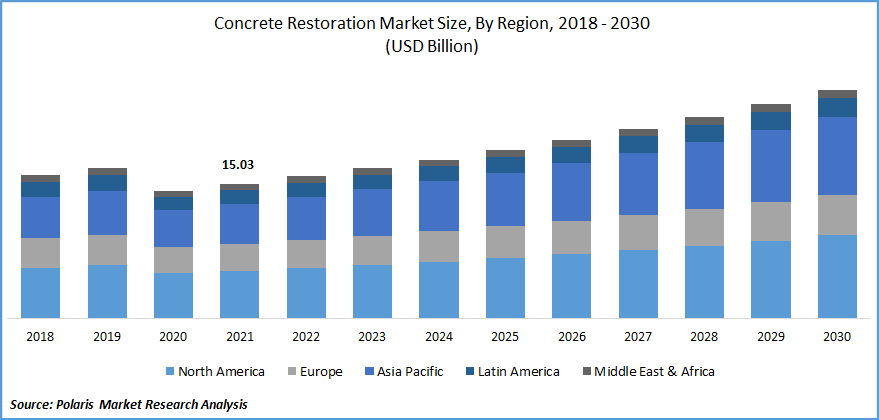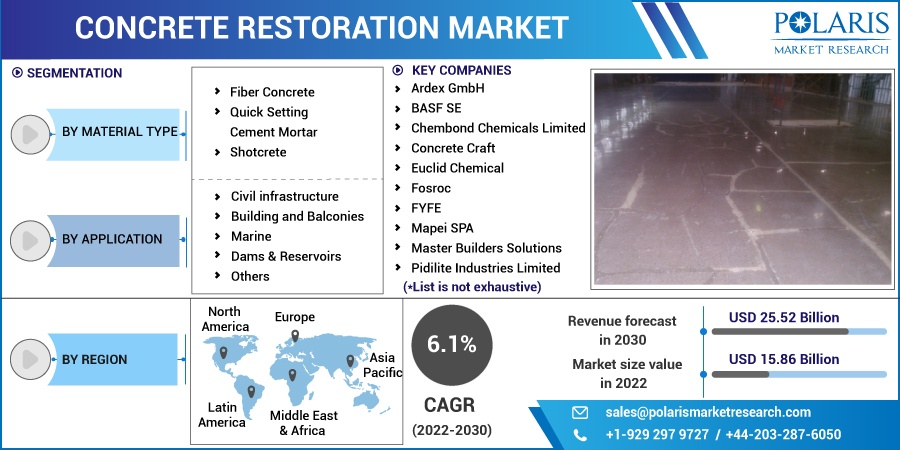
Concrete Restoration Market Share, Size, Trends, Industry Analysis Report, By Material Type (Fiber Concrete, Quick Setting Cement Mortar, Shotcrete); By Application; By Region; Segment Forecast, 2022 - 2030
- Published Date:Oct-2022
- Pages: 101
- Format: PDF
- Report ID: PM2652
- Base Year: 2021
- Historical Data: 2018-2020
Report Summary
The global concrete restoration market was valued at USD 15.03 billion in 2021 and is expected to grow at a CAGR 6.1% during the forecast period. Concrete restoration is a method that is used for refurbishing damaged and old concrete. This method is lesser expensive than constructing new and enables the repairing of cracks with structural issues.

Know more about this report: Request for sample pages
Concrete restoration uses various material types, such as fiber concrete, quick-setting cement mortar, and shotcrete. Fiber cement is a complex mixture of wood fiber, cement, water, and silica that covers both non-residential and residential areas.
Fiber cement products offer superior properties, such as water resistance, versatility, high durability, flexibility, and thermal insulation, and thus, are a preferred choice. Additionally, it involves lower maintenance and is mainly used in roofing, siding, and trimming, among others.
Infrastructure spending has recovered from the global financial crisis and is expected to grow significantly over the coming decade. Further, rising urbanization and growing population in emerging countries such as China, India, and Japan would lead to greater investment in infrastructure development for transportation, water, and power, driving the demand for concrete restoration.
The COVID-19 pandemic affected the global market and its associated opportunities owing to the substantial decline in the supply of raw materials due to the worldwide lockdown. There was a scarcity of supplies due to restrictions on movement and the closing of borders.
Delays in construction projects, lack of workforce, and transportation restrictions further hampered the market growth during the pandemic. The industry was also affected by operational challenges and disruptions in the supply chain. However, the industry is expected to experience growth post-pandemic on account of economic growth and a rise in construction activities and infrastructure development.
 Know more about this report: Request for sample pages
Know more about this report: Request for sample pages
Industry Dynamics
Growth Drivers
The rise in population, growth in urbanization, especially in developing economies, and aging of existing infrastructure support the growth of the industry. Rise in consumer disposable income; economic growth increases the demand for this restoration. Greater need to ensure the long-life span of buildings, strengthen the building and construction sector, rise in investment in the development of public infrastructure to support the growth of the global market.
The significant impacting factors of the concrete restoration market include a rise in demand for sustainable infrastructure and the need to reduce the rising carbon footprint due to construction. In addition, the industry is influenced by wide applications for reliable and durable construction. Furthermore, factors such as expensive pricing and environmental concern due to quarries and mining affect the growth of the industry.
Further, this restoration has observed a surge in civil infrastructure. Application in commercial, residential, and industrial sectors stimulates industry growth. Infrastructure investment requirements are huge worldwide, particularly so in developing economies.
Report Segmentation
The market is primarily segmented based on material type, application, and region.
|
By Material Type |
By Application |
By Region |
|
|
|
Know more about this report: Request for sample pages
Quick setting cement mortar segment is expected to hold a significant share in 2021
The quick-setting cement mortar segment is expected to hold a significant share during the forecast period. This is due to the rapid drying of the mortar; also, this is used in underwater construction where the cement quickly settles down. Moreover, it is also a low-cost construction material as it is one of the widely available component materials.
It has several uses, such as producing cement plaster and grout, amongst others. Thus, it provides higher strength to the material, reduces permeability, reduces the heat of hydration, and improves durability.
Civil infrastructure accounted for the largest market share
Civil infrastructure is expected to be the largest segment in the concrete restoration industry. The rising economy and increasing population in developing countries are the factors causing damage to the roads and infrastructure. The civil infrastructure includes roads, tracks, parks, metro tracks, bridges, tunnels, and others.
These structures are heavier as compared to commercial and residential buildings and hence require constant maintenance and repair to sustain extreme weather conditions and increase the service life of the infrastructure.
The rise in projects for developing more civil infrastructure due to damaged old buildings and a rise in the need for regular repair & maintenance is anticipated to pave the way for the adoption of concrete restoration. Developing countries are most likely to adopt these restoration products to reduce their expense on maintenance and invest in new projects, which significantly fuels the growth of the market.
Residential and commercial buildings are a prime focus for the concrete restoration market. Growing commercial and residential projects globally are anticipated to lead to faster growth and acceptance. This, in turn, is expected to drive the growth of this segment during the forecast period.
While cost concerns are limiting the practical use of restoration at a large scale, its environmental and safety benefits are expected to help to reduce the overall expense associated with it. Hence, adequate availability of the new type of concrete for residential and commercial applications is expected to boost market growth.
Asia Pacific region will lead the global market by 2030
Asia Pacific region is expected to account for a larger share of the concrete restoration market. Developing economies in the Asia-Pacific region, such as India, Australia, and Indonesia, are expected to support the market expansion due to the increasing demand for residential construction.
The Japanese construction sector continues to be positive, as it benefits from the increased demand caused by a rebound in the construction of residential projects and other projects such as the Tokyo Olympics.
Further, in Thailand, infrastructure spending is expected to accelerate as the government has approved many infrastructure projects. Many Asian countries are adopting these restoration products mainly due to their potential advantages of quickness and affordably.
Competitive Insight
Some of the major players operating in the global market include Ardex GmbH, BASF SE, Chembond Chemicals Limited, Concrete Craft, Euclid Chemical, Fosroc, FYFE, Mapei SPA, Master Builders Solutions, Pidilite Industries Limited, RPM International Inc, Saint Gobain Weber, Schomburg GmbH & Co. KG, SIKA AG, and TCC Materials.
The leading companies operating in the global market are launched new products and solutions to cater to the rising consumer demand. Partnerships, collaborations, and mergers further enable these companies to expand their geographic presence and enter new geographic regions. Many small and medium sized business have entered the market and introduced innovative products to cater to the growing consumer demand.
Recent Developments
In July 2021, Sika UK launched a new product on low-carbon repair mortars, that is undertaken keeping the environmental concerns in mind.
In December 2019, Sakrete which is a world leader in concrete and its related goods, announced Pro-Mix, an introduction under their product portfolio. This is especially for professions to help in the repair work for industrial and commercial sector.
Concrete Restoration Market Report Scope
|
Report Attributes |
Details |
|
Market size value in 2022 |
USD 15.86 billion |
|
Revenue forecast in 2030 |
USD 25.52 billion |
|
CAGR |
6.1% from 2022 - 2030 |
|
Base year |
2021 |
|
Historical data |
2018 - 2020 |
|
Forecast period |
2022 - 2030 |
|
Quantitative units |
Revenue in USD billion and CAGR from 2022 to 2030 |
|
Segments covered |
By Material Type, By Application, By Region |
|
Regional scope |
North America, Europe, Asia Pacific, Latin America; Middle East & Africa |
|
Key companies |
Ardex GmbH, BASF SE, Chembond Chemicals Limited, Concrete Craft, Euclid Chemical, Fosroc, FYFE, Mapei SPA, Master Builders Solutions, Pidilite Industries Limited, RPM International Inc, Saint Gobain Weber, Schomburg GmbH & Co. KG, SIKA AG, and TCC Materials. |
License and Pricing
Purchase Report Sections
- Regional analysis
- Segmentation analysis
- Industry outlook
- Competitive landscape
Connect with experts
Suggested Report
- Bariatric Surgery Devices Market Share, Size, Trends, Industry Analysis Report, 2022 - 2030
- Engineering Services Outsourcing (ESO) Market Share, Size, Trends, Industry Analysis Report, 2022 - 2029
- Telepsychiatry Market Share, Size, Trends, Industry Analysis Report, 2021 - 2028
- Wearable Technology Market Share, Size, Trends, Industry Analysis Report, 2022 - 2030
- Feed Pigment Market Share, Size, Trends, Industry Analysis Report, 2022 - 2030

